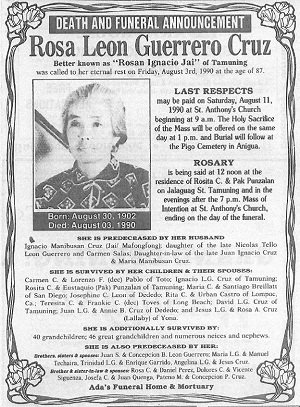 As I continue to receive more documents from collaborators of the Chamorro Roots Genealogy Project, I was elated (thank you Lisa) that one of the documents contained my maternal grandmother's 1990 funeral announcement. It was certainly a better copy than of the one I had on file. Just looking at her picture and the names on her announcement brought back some memories and thoughts of her.
As I continue to receive more documents from collaborators of the Chamorro Roots Genealogy Project, I was elated (thank you Lisa) that one of the documents contained my maternal grandmother's 1990 funeral announcement. It was certainly a better copy than of the one I had on file. Just looking at her picture and the names on her announcement brought back some memories and thoughts of her.
The former Rosa Salas Leon Guerrero was also known to family members as Nan Ocha or Tan Ocha. Her parents were the former Carmen de Salas and Nicolas Tello de Leon Guerrero (Manggåfan Matias). Nåna had five other siblings: two brothers (Juan and Jose) and three sisters (Maria, Trinidad, and Angelina). I had only met one of Nåna's siblings: Nan Lia (Maria) married to Manuel Duenas Techaira. All the others had passed away before or during the war.
We called our grandmother, "Nåna." But Nåna means mother and Nåna Biha or Guela means grandmother. Perhaps this was the beginning of a cultural shift in language from my generation; the tail end of the baby boom era? As children we learn many things through mimicking, so I'm certain that we mimicked our Aunts and Uncles to call her Nåna. I am curious to hear other thoughts on this.
I remember Nåna as a very resilient woman: mentally and physically. Had all her children survived, there would have been nineteen of them. But only nine of them survived beyond childhood. Yes, there were a few that were actually miscarriages. But what if all of them survived? There would have been two generations of siblings; the latter nine being the second generation.
Tåtan Jai (Yai)? He was a U.S. Navy civil servant and after the war I was told he made many trips to Sa’ipan to deliver payroll. Out of all of us grandchildren, my oldest cousin John was the only to ever meet Tåta. But even at that, John did not have a chance to get to know him because he was only an infant when Tåta passed away in 1952.
My very first memories of Nåna go back to when I was about five years old. My dad, who was in the Air Force, received his orders for Vietnam and decided to take us back to Guam until he completed his tour in Vietnam. So we stayed at Nåna’s house. Each time we left Guam and returned, we were back at Nåna’s house.
Although all of Nåna’s siblings preceded her in death, her siblings’ children quite often visited and checked in on Nåna.
I have always felt and experienced the strong bond and connection with the maternal side of my family. I am sure it flows from our ancient matrilineal society. Our family’s cultural spirit emanates from Nåna, her Nåna and those before them. God bless them all.

